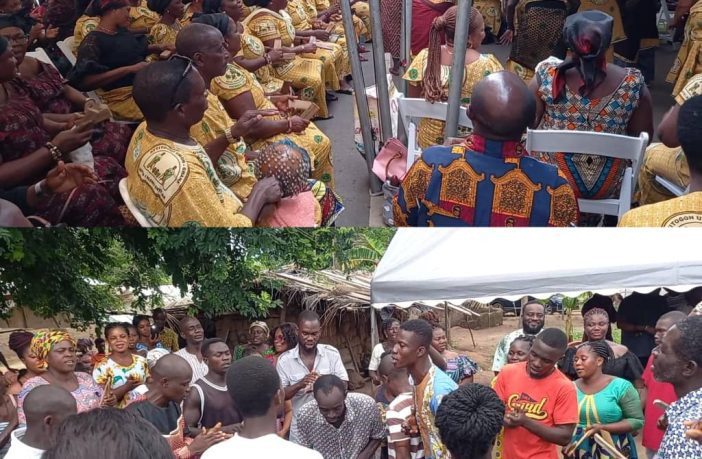|
Getting your Trinity Audio player ready...
|
From hands to clappers; Modernising rhythms of the African traditional music. Clappers have been part of Ghana music for centuries, providing rhythmic accompaniment in various traditional music at events and celebrations but what could have resulted in their ‘reincarnation’?
What are clappers?
A Clapper, according to the Britannica, is a musical instrument consisting of pieces of wood, bone, metal, or other sonorous substance either held in both hands or fastened together, held in one hand, sometimes with a handle and struck against each other.
Clappers have been played throughout the world since ancient times, often with a ritual, warning, work-coordinating, or signaling function, rather than a musical one.
The history of traditional African music can be traced back to the earliest civilizations on the continent, where music played an essential role in the cultural, traditional and spiritual practices of African communities.
Clapping using the human hands remained a significant aspect of traditional African music as it creates rhythms and beats. However, the phenomenon seems to be evolving over time with the introduction of new instruments such as wood or bamboo sticks.
The introduction of the wood or bamboo sticks has not taken away the African rhythm the human hands have created over the centuries and continue to create from generations to the other.
It is surprising to note that the ‘kpla kpla’ sound the human hand could make, can easily be repeated using the wood or the bamboo stick at a louder decibel and at a longer period without feeling the fatigue and pain experience using the hand.
The introduction of the clappers, however, adds flavour and gives more rhythm to the music being performed.
Sounds from clappers have also been programmed on keyboards to produce melodious tunes in modern times, taking the phenomenon to the next level.
According to records from the Volta Regional Directorate of the Centre for National Culture, long before its introduction into music, clappers were used in traditional settings for various purposes.
“In the olden days, they were used to precede appellations to gods in shrines. It usually consists of two sticks that are struck against one another. Over time, the clapper found its way into traditional music, initially as a complimentary instrument that mimics handclapping.”
Clappers, when combined with handclapping, there is an effect of a deeper vibrating sound mimicking several hand-clapping sounds.
In traditional music settings, the clapper preferably made of bamboo sticks, is referred to as “kpari mamm” or “mamm.”
History
Therefore, the use of clappers in Ghanaian music can be traced back to the traditional percussive instruments like the gourd rattle or “Seprewa” and the palm nut rattle or “awaa.”
Over time, the design and materials of these instruments changed, leading to the incorporation of clappers made from wood, metal, or other materials.
Clappers became popular due to their versatility and ability to produce distinct rhythmic patterns, enhancing the overall sound of Ghanaian music, including traditional drumming ensembles, highlife music, and contemporary genres like hiplife and afro-beats.
Groups have since adopted the use of these clappers in their performances including the Elikem Jama Group in Fodome, in the Hohoe Municipality of the Volta region and the Attitogon Union-Ghana Group in Accra.
While the Attitogon Union-Ghana Group in Accra uses wooden sticks to create the ‘modernised’ rhythms, the Elikem Jama Group in Fodome uses bamboo sticks as their clappers.
Mr Kodzo Lavanyo, the General Secretary, Attitogon Union-Ghana speaking to the Ghana News Agency (GNA) disclosed that the wooden sticks were adopted because they created louder sounds than the hand could create.
He said the sticks also prevented pain and fatigue since their use was comfortable to their members while they were performing.
Mr Emmanuel Mawuli Akatse, Leader of the Elikem Jama Group on the other hand revealed that using the bamboo sticks created a loud sound without exerting much pressure from them.
He said during one of their performances, some foreigners thrilled without the use of the bamboo sticks demanded some of the sticks as souvenirs to show to colleagues since it was their first-time, they came across such ‘innovation.’
Health Benefits of Clapping
The healthsite.com stipulated that clapping plays a key role in curing heart and lung-related problems like asthma, provides relief from back, neck and joint pain and gives relief from gout.
It also noted that clapping was an effective therapy for digestive disorders, aids skills enhancement of children and improves their academic performance, increases immunity, and thus keeps diseases at bay.
Could the use of clappers deny the groups the benefits?
Mrs Lydia Nyarko-Ampomah, Volta Regional Director, Centre for National Culture, speaking on the use of clappers in traditional Ghanaian music, told the GNA that the use of clappers in the Ghanaian culture had both positive and negative effects depending on the context and perspective.
She said clappers were part of Ghana’s rich musical heritage, contributing to the preservation and promotion of traditional music and cultural practices and add depth and complexity to Ghanaian music, enriching the rhythmic landscape and enhancing the overall listening experience.
Mrs Nyarko-Ampomah said the use of clappers often involved communal participation, fostering a sense of unity and social cohesion among performers and audiences and provide musicians with additional tools for artistic expression, allowing for creative exploration and innovation within Ghanaian music sectors.
She said some negative effects included commercialization thus in modern context, there may be a tendency to commercialize traditional music, leading to the dilution or distortion of cultural authenticity.
Mrs Nyarko-Ampomah also noted that another effect was cultural appropriation where there was a risk that the appropriation of Ghanaian music elements, including clappers, by external influences could undermine the integrity and significance of the cultural elements.
She said as Ghanaian society evolved and modernizes, there may be a decline in the transmission of traditional musical knowledge and skills, potentially leading to the loss of cultural heritage associated with clappers and other traditional instruments.
School experience
Madam Akorfa Fomeade, Music Tutor, Hohoe E.P. Senior High School (HEPSS) told the GNA that although folk music was accompanied by normal handclapping, modernity was setting-in, which resulted in the change of many things.
She said the groups believed that handclapping was no longer sounding as it used to be hence improvising the clapping with clappers to beef up their performances not knowing that the handclapping was medicinal.
Madam Fomeade said the introduction of clappers had taken away the originality of the sound from handclapping but until one witnessed the use of clappers, the sound produced was not much different.
“As we clap our hands, it makes use of our veins, and it is a medicine to the body. In that field, we are losing it but looking at the value of clapping in the performance, we are not losing it but rather making the performance livelier.”
Some music lovers noted that although the introduction of the clappers may deny the groups of some health benefits, the clappers aided them to perform longer to the enjoyment of the spectators.
Conclusion
In conclusion, while clappers play a vital role in Ghanaian traditional music, it is essential to balance innovation and preservation to ensure that they continue to contribute positively to the cultural landscape.
Source: GNA





